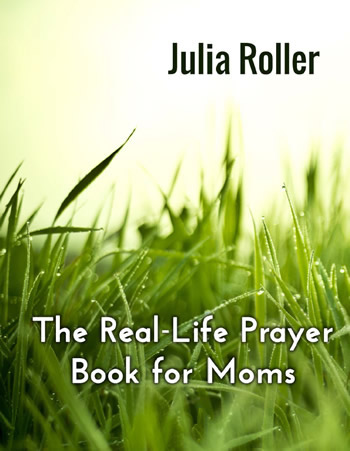Moms tend to be preoccupied with time. Or more precisely, with time management. The moms in the MOPS group I coordinate ask for a time management speaker every semester, worried by the way the days seem to stretch out forever yet also mysteriously elapse while they’re changing diapers and administering snacks, often leaving them feeling like they are accomplishing very little.
My kids are all out of the diaper phase, but I worry about time too. I want to spend my time wisely and productively, and I have a near-constant sinking feeling that I am wasting too much of it. Motherhood seems to have exacerbated in me a sense that I should be more productive than I am. I’m not alone in this feeling, I know. Everywhere we look there seems to be tips on how to do more, sleep less, create better habits, make the most of everything—all offered by people who seem to be doing all of these things better than we are. The hidden message in all of this is that not only should we be more productive, but that productivity is the goal of life.
This feeling presents a particular challenge since I’m currently in what I think of as my chauffeur phase of life, where it seems like I’m always hopping in my car to drive one of my three kids somewhere or pick up another one from somewhere. Three kids, three different schools, multiple sports and activities. Many days I feel like an unpaid Uber driver.
On most weekday mornings I look at my schedule for the day and realize I’m going to spend most of it in my car, again, traversing the streets of my town. All of these little repeated back-and-forths can feel like wasted time, time that could be better spent doing something “productive.” So I’m often tempted to try to double up so I can feel more useful—taking work calls or listening to a podcast or an audiobook while I’m driving, for example. Or even worse, I spend my little drives frantically going over all the “important” things I need to do as soon as I’m done with this unimportant duty. That never fails to make me feel scattered and anxious rather than productive. As I tell my MOPS moms but sometimes fail to remember myself, multi-tasking generally leads to performing all the tasks poorly, at least in my experience, despite what we like to think about it being a particular mom superpower.
In How to do Nothing, Jenny Odell points out that most of us are whipped up into “a permanent state of frenzy” by all the various forms of media competing for our attention. It’s no wonder we often feel frantic about the way we’re spending our time. I find Odell’s book a good corrective to our national obsession with productivity.
In response to the cultural pressure to do more and more, she encourages her readers to “do nothing,” which she describes as “refusing productivity and stopping to listen” (p. 22). Although I don’t believe Jenny Odell identifies as a Christian, she has a Christian sensibility. Proverbs 31 woman aside, there’s not a lot of productivity inspo in the Bible. In fact, I think if we examine our deep desires to be productive or considered productive by others (and therefore successful), I don’t think we would find a lot of Jesus there.
The way Jesus spent his time as recorded in the Bible was hardly what most of us today would consider productive—wandering, teaching, eating, spending time alone and with friends, telling lots and lots of stories. Henri Nouwen referred to prayer as wasting time with God, and I think many spiritual practices can be characterized this way.
Odell’s answer to rejecting the siren song of productivity is simply to pay attention, something many of us pay lip service to but struggle to actually practice. At least I do. Yet I’ve also grown to recognize the value of paying attention to the moments in my many drives with my children. I’ve long believed that the best way to get a boy to open up to you is to put him in a car next to you, where you’re together but not looking at each other. It works on my seven-year-old daughter too, although truth be told, it’s not a great challenge to get her to talk.
Because two of my three are old enough to stay home by themselves or watch their little sister, I get lots of opportunities to be alone with each of them in the car, as we’re driving to school dropoff or soccer practice or batting lessons. It’s become increasingly clear to me what a gift this is. I would never trade my son’s opening up about what is making him anxious at school, my daughter’s cheerful retelling of all the recess antics, or my other son’s musings about his latest selections on Spotify.
There’s nothing particularly productive about any of these conversations, but yet I treasure them. As my children grow up and it becomes more clear how limited my time with them actually is, these little interludes in the car feel more and more precious. Viewed through this lens, these short drives no longer feel like wasted time. They feel instead like they might be the best possible use of my time.
So I continue to work on this concept of paying attention rather than being productive. Rather than obsessing over what I should be doing, what I could be doing, or what I didn’t do, I notice what is going on around me, who is in the car with me, what they’re saying and what they’re not saying, and how I am feeling. One of the many benefits of this practice is that it’s very difficult to be anxious when you’re paying attention, when you’re in the moment, because anxiety lives almost exclusively in what happened in the past, or what you fear could happen in the future. It very rarely exists in what is actually happening right now.
I’m sure tomorrow I’ll be playing a podcast and fretting over my to-do list at some point when I’m performing my chauffeur duties, but my hope is that I’ll catch myself, turn off all the other stuff, and give that time instead to being in the present with my passenger, open to all the possibilities that it might bring. I hope that for you too.
This article first appeared in the Redbud Post.



